When your toddler experiences diarrhea, it can be concerning and leave you feeling uncertain about the best course of action. You might notice signs like frequent, loose stools or signs of dehydration that signal the need for attention. Understanding the causes, from infections to dietary changes, is essential for effective solutions. As you navigate this challenging situation, knowing when to seek medical help can make a significant difference. But what are the most effective strategies for managing this condition at home? Let's explore the key insights you need to ensure your child's well-being.
Understanding Toddler Diarrhea
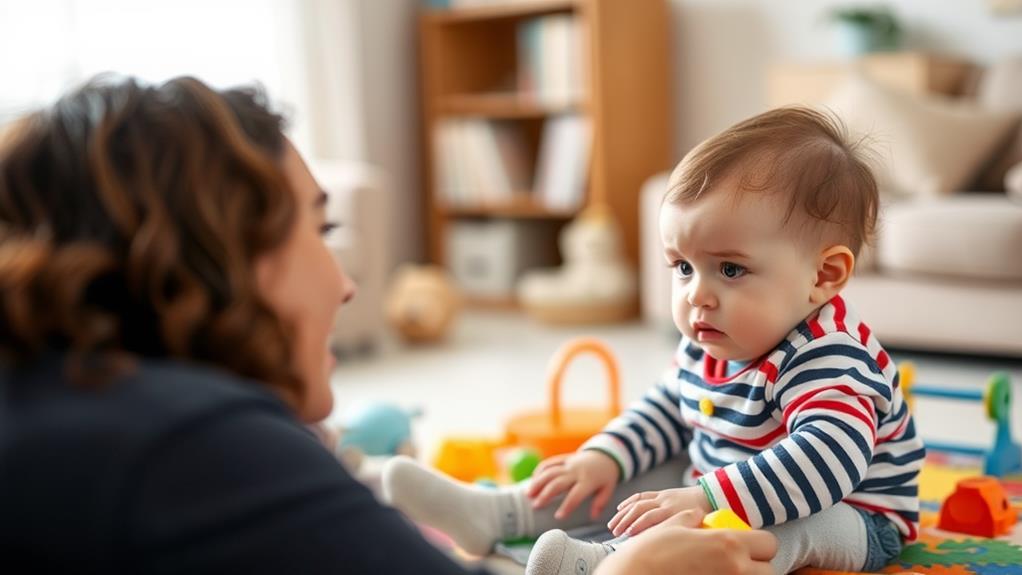
When it comes to toddler diarrhea, many parents find themselves puzzled by its causes and effects. You might notice loose, watery stools in your little one, and it can happen suddenly. Often, it's a sign that their digestive system is reacting to something. It could be a viral or bacterial infection, dietary changes, or even stress. Understanding these triggers can help you manage the situation better.
It's important to remember that toddlers have sensitive stomachs. Their bodies are still developing, and they're exposed to new foods and environments. If your child recently started a new diet or returned from daycare, these changes might be contributing to their discomfort.
Keep an eye on their hydration levels, as diarrhea can lead to dehydration, which is a key concern for young children.
In many cases, toddler diarrhea isn't serious and resolves on its own. However, knowing when to seek help is crucial. If diarrhea persists for more than a couple of days or is accompanied by other symptoms, it's wise to consult a pediatrician.
Being informed empowers you to take the best care of your child during these challenging moments.
Common Signs to Watch For
Vigilance is key when it comes to recognizing toddler diarrhea, as certain signs can indicate a more serious issue. You should keep an eye out for frequent, watery stools that occur more than three times in a day. If your little one seems to be experiencing discomfort or cramps, it's essential to take note.
A sudden change in their appetite or drinking habits can also signal trouble; they may refuse food or show less interest in their favorite drinks.
Watch for any changes in their energy levels. If your toddler is unusually lethargic or irritable, this could be a red flag. Additionally, keep an eye on their hydration status. Signs of dehydration include dry mouth, decreased urination, and excessive thirst. If you notice any of these symptoms, it's crucial to act quickly.
Lastly, if your child has a fever above 101°F (38.3°C) or if there's blood in their stools, seek medical advice immediately. Being aware of these signs can help you respond appropriately, ensuring your toddler gets the care they need.
Potential Causes of Diarrhea
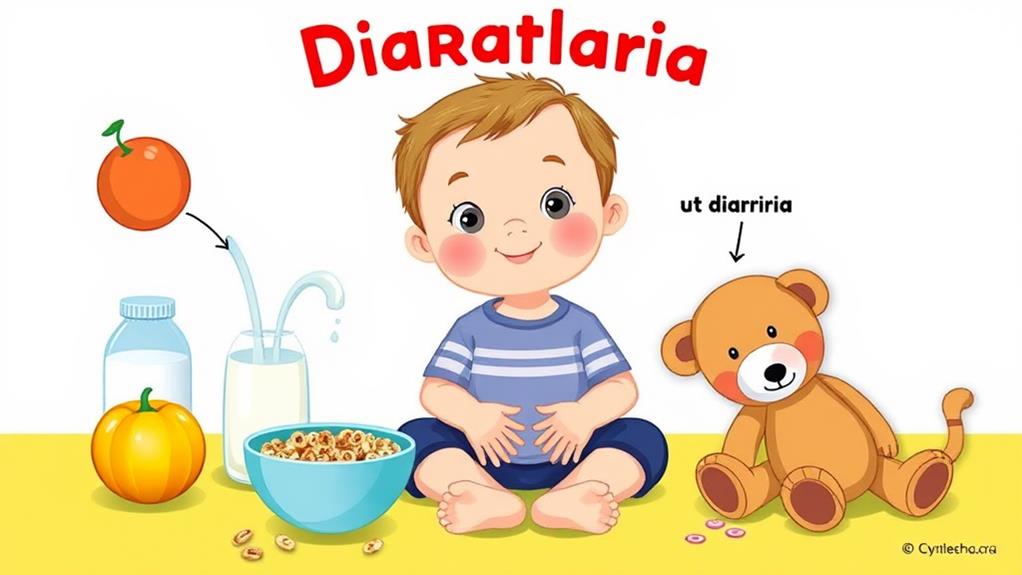
Diarrhea in toddlers can stem from a variety of causes, making it essential to pinpoint the source for effective treatment. One common cause is viral infections, like the rotavirus, which can lead to inflammation in the intestines. These infections often spread through contaminated food or water, so keeping your little one's hands clean is crucial.
Bacterial infections, often from undercooked food or unsanitary conditions, can also trigger diarrhea.
Another potential culprit is dietary changes. If your toddler suddenly tries new foods or has too much juice, their digestive system might react negatively. Food allergies or intolerances, especially to dairy or gluten, can contribute too.
Additionally, antibiotics can disrupt your toddler's gut bacteria, leading to diarrhea. Stress or emotional upheaval can also play a surprising role, as young children sometimes express their feelings physically.
Lastly, teething can cause mild diarrhea in some toddlers, adding to your list of possible causes. By understanding these factors, you can approach your toddler's diarrhea with a clearer idea of what might be happening and how to help them feel better.
When to Seek Medical Help
Recognizing the signs that your toddler needs medical attention is crucial for their well-being. If your little one experiences diarrhea lasting more than a couple of days, it's time to consult a doctor. Prolonged diarrhea can lead to dehydration, which can be serious for toddlers.
Keep an eye out for symptoms like a high fever over 101°F, which may indicate an infection. You should also seek help if you notice blood or mucus in their stool. This can signal a more serious condition that needs immediate attention.
Additionally, if your toddler seems unusually lethargic, irritable, or unable to keep fluids down, don't hesitate to reach out to a healthcare professional. These signs can indicate that your child is struggling to stay hydrated.
Lastly, if your toddler is experiencing severe abdominal pain or persistent vomiting, it's best to err on the side of caution and contact your doctor. Remember, it's always better to ask a professional than to wait and see.
Trust your instincts; your child's health is worth it. By staying alert to these signs, you can ensure your toddler receives the care they need.
Hydration Importance in Treatment
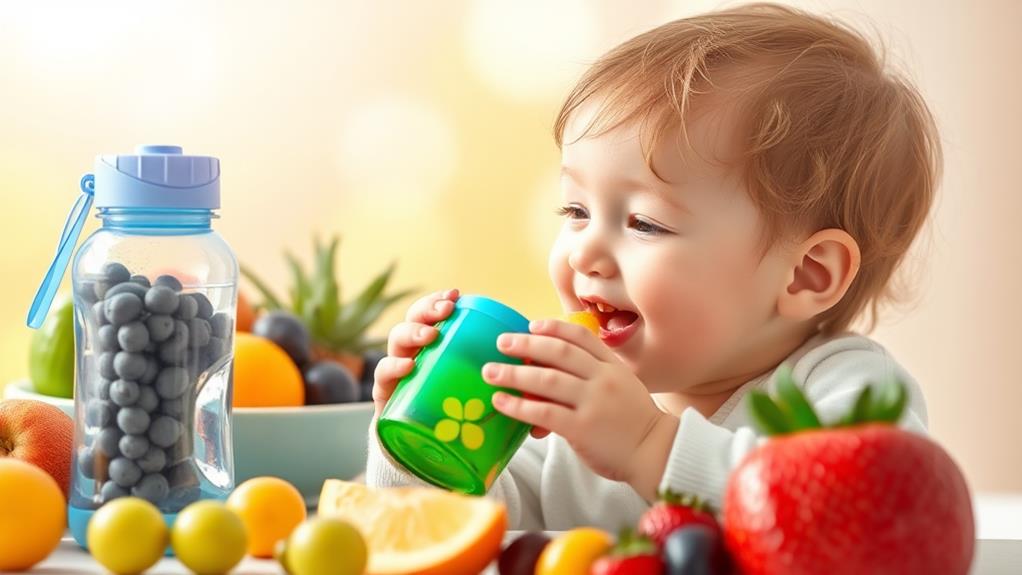
When your toddler is unwell, especially with diarrhea, keeping them hydrated is a top priority. Diarrhea can lead to a rapid loss of fluids, which might result in dehydration if not addressed promptly. You may notice signs like dry lips, decreased urination, or irritability, all of which indicate that your little one needs more fluids.
Start by offering clear fluids such as water or an oral rehydration solution, which is specially designed to replace lost electrolytes. These solutions are often available at pharmacies and can be a game-changer in managing hydration.
Don't worry if your toddler isn't keen on drinking a lot at once; it's perfectly fine to offer small sips frequently throughout the day. You might also consider using a syringe or a cup with a straw, as these can make drinking more appealing.
If your toddler refuses to drink anything, try serving ice chips or popsicles, which can help hydrate them while being fun to consume.
Dietary Modifications for Recovery
Making dietary modifications can significantly aid your toddler's recovery from diarrhea. Start by incorporating easy-to-digest foods into their meals. Bananas, rice, applesauce, and toast—often referred to as the BRAT diet—are excellent choices. These foods can help firm up stools and provide necessary nutrients without overwhelming their digestive system.
Avoid sugary snacks and drinks, as they can worsen diarrhea. Instead, focus on offering clear broths, plain crackers, and steamed vegetables. Probiotics, like yogurt, can also be beneficial, as they help restore healthy gut bacteria. Just be sure to choose plain yogurt without added sugars.
Keep portion sizes small, as your toddler's appetite may decrease during recovery. Offer frequent, smaller meals rather than three large ones. This approach can make eating feel less overwhelming and help with digestion.
Lastly, pay attention to any food allergies or sensitivities your toddler may have, as these can exacerbate diarrhea symptoms. By making these thoughtful dietary changes, you'll support your toddler's recovery and help them feel better faster.
Over-the-Counter Solutions
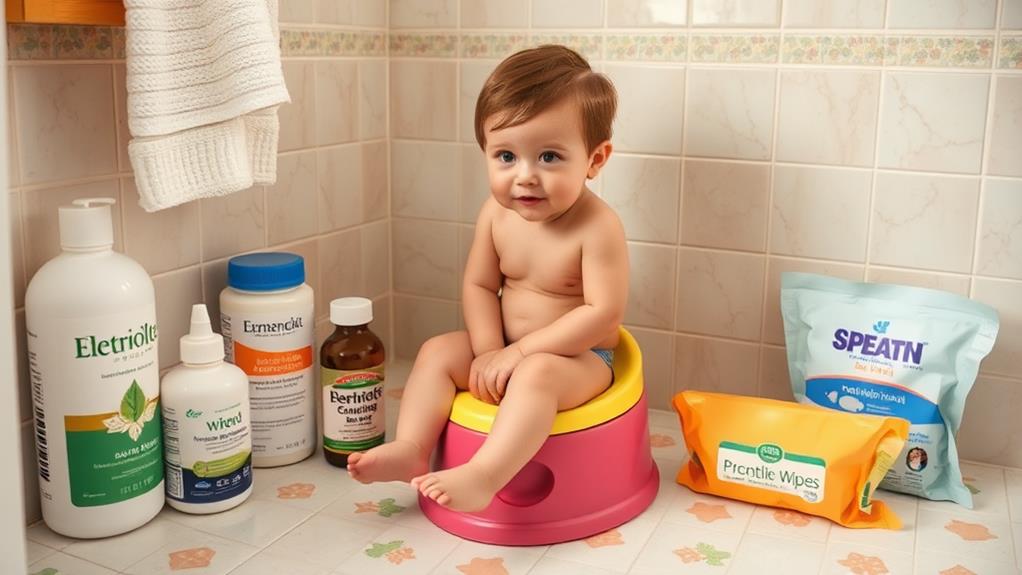
There are several over-the-counter solutions that can help manage your toddler's diarrhea effectively.
First, you might consider electrolyte solutions, like Pedialyte. These drinks replace lost fluids and essential minerals, ensuring your little one stays hydrated. Just be sure to offer it in small sips, as too much at once can upset their stomach.
Another option is a probiotic supplement. Probiotics contain beneficial bacteria that can help restore balance in the gut. You can find these in liquid or powder forms, making them easy to mix with your child's food or drink.
Some parents also turn to anti-diarrheal medications. However, it's crucial to consult your pediatrician before using these, as they're not always suitable for young children. Your doctor can help determine what's appropriate based on your child's age and health.
Lastly, you might explore fiber supplements, but again, check with your doctor first. It's vital to ensure any treatment aligns with your toddler's specific needs.
Home Remedies to Consider
If your toddler is experiencing diarrhea, you might want to try some home remedies to ease their discomfort. First, ensure your child stays hydrated. Offer plenty of fluids like water, broth, or an electrolyte solution designed for kids. This helps replace lost fluids and prevents dehydration.
Next, consider a bland diet. Foods like bananas, rice, applesauce, and toast—often referred to as the BRAT diet—can be gentle on their stomach and help firm up stools. You could also introduce plain yogurt, as it contains probiotics that can support gut health.
Another remedy is chamomile tea. Its soothing properties can help calm your toddler's digestive system. Just make sure it's cooled down before offering it to them.
Additionally, keeping your little one comfortable is important. Encourage them to rest, as their body needs energy to recover.
Lastly, if you notice any concerning symptoms, like blood in stools or a high fever, consult your pediatrician right away. These home remedies can provide relief, but always stay vigilant about your toddler's health.
Preventive Measures for Parents
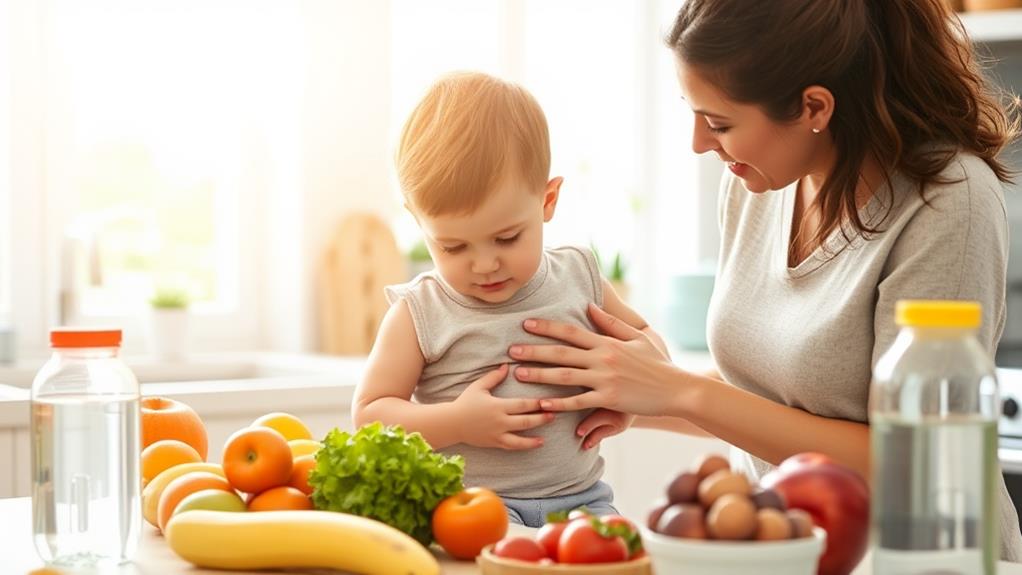
Preventing diarrhea in toddlers starts with good hygiene and safe food practices. Wash your hands and your toddler's hands frequently, especially before meals and after using the bathroom. This simple habit can significantly reduce the risk of infections that lead to diarrhea.
When it comes to food, always ensure that everything is fresh and properly stored. Avoid giving your toddler undercooked meats, unpasteurized dairy products, or raw fruits and vegetables that haven't been washed thoroughly. These can harbor harmful bacteria that might upset your little one's stomach.
Keep an eye on your toddler's hydration. Offer plenty of fluids, especially water, to help maintain their fluid balance. If you're introducing new foods, do so gradually, monitoring for any adverse reactions.
Also, make sure your toddler is up-to-date with their vaccinations, as some can protect against infections that cause diarrhea.
Lastly, create a safe environment by keeping your home clean and minimizing exposure to sick children.
Long-term Health Considerations
Understanding the long-term health considerations associated with toddler diarrhea is crucial for parents. Frequent episodes of diarrhea can lead to dehydration, which might affect your child's overall health if not managed properly.
If your toddler experiences diarrhea for extended periods, it can also hinder their growth and development. Nutritional deficiencies might arise, as diarrhea can prevent your child from absorbing essential nutrients.
It's important to keep an eye on your toddler's eating habits during and after these episodes. They may become picky eaters or refuse foods that upset their stomach. This can create a cycle of poor nutrition, impacting their energy levels and immunity.
In some cases, prolonged diarrhea may signal an underlying condition, such as lactose intolerance or a food allergy. If your child frequently experiences diarrhea, it's wise to consult your pediatrician.
They can evaluate for any serious issues and recommend appropriate dietary changes or treatments.
